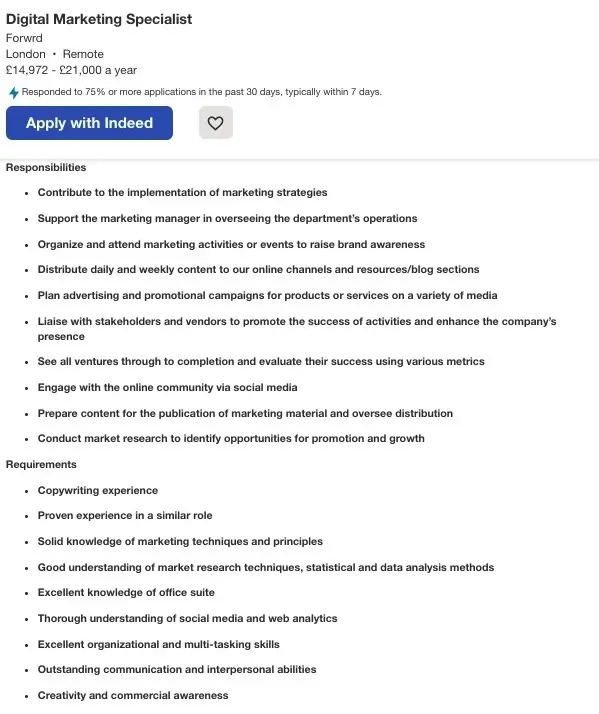There are many exciting jobs in the field of digital marketing—one being the digital marketing specialist role. So what does this particular path entail? Keep reading to find out.
In a world where brand awareness is everything, marketers must build strong relationships between their business and their customers in every possible sphere. And the online space is no exception. In fact, according to Reuters, global spending on digital marketing is currently at around $100bn, with $52bn spent in the United States and the United Kingdom alone.
Needless to say, you don’t need to be working in the field to know that digital marketing is everywhere. Whether you’re on social media, email, shopping, or gaming online, you’ll have encountered it in one form or another. But as the digital world continues to evolve, it can be hard to define exactly what digital marketing involves and what a digital marketing specialist does.
This post aims to demystify the field so that you can decide whether a career as a digital marketing specialist might be right for you. We’ll keep things as simple and jargon-free as possible, giving you all the information you need to get your head around the topic.
We’ll cover:
- What is digital marketing?
- What does a digital marketing specialist do?
- Digital marketing specialist job description: Main tasks and responsibilities
- Digital marketing specialist salary
- Top digital marketing specialist skills
- How to become a digital marketing specialist
- Digital marketing specialist FAQs (and answers)
- Key takeaways
Ready to find out what a digital marketing specialist actually does? Let’s go.
1. What is digital marketing?
OK, let’s get back to first principles. What is digital marketing?
Digital marketing is the area of marketing that is delivered entirely through digital channels. This simply means that all efforts take place online, through social media, via email, search engines, websites, across digital devices, and so on. The goal of digital marketing is to build relationships with existing and potential customers or to promote products and services.
Relatively speaking, digital marketing is a new concept. It didn’t exist before the dawn of the internet. In the past 20 years, however, it has become the norm. Computers and cell phones are now ubiquitous in our lives. It only makes sense, then, that marketing is delivered through these channels. Just pause for a moment to think about how much shopping you do online. How many hours a week do you spend on sites like Instagram or TikTok? Or checking your emails? All these channels (and more) provide digital marketers with the perfect opportunity to build new relationships with their customers or to cultivate existing ones.
Unlike traditional marketing, which only takes place offline and which purely goes one way, digital marketing offers a unique opportunity for a two-way interchange between brands and their customers. Both parties can contribute to the relationship, adding value not just to a business, but also to the customer. This unique approach allows companies to tailor their offering to a customer’s needs in a way that they never could before. It is this aspect of digital marketing that ensures it is, without doubt, here to stay.

2. What does a digital marketing specialist do?
Now we have a broad understanding of what digital marketing is, what does a digital marketing specialist’s job involve? Let’s take a high-level view.
What does a digital marketing specialist’s job involve?
In a nutshell, a digital marketing specialist’s job is to develop and oversee online marketing campaigns. This sounds simple, but what does it mean?
Ultimately, a digital marketing specialist must use a variety of tactics to create campaign content and then deliver this content to the appropriate device or platform, to be seen by their chosen target audience.
This involves a variety of complex tasks. For instance, a digital marketing specialist’s first job is to collect data on potential or existing customers. What are the customer’s interests? Where do they go online? What kind of content might they connect with? After diving into the data, digital marketers will use this information to devise a strategy. This could involve some or all of the following: email campaigns, online advertising and search engine marketing (SEM), search engine optimization (SEO), content production (including videos and blogs), websites, and so on.
Carrying out these tasks effectively means taking a holistic view of a customer, their needs, and objectives. It also means having the technical skills to execute such a campaign. While digital marketing specialists usually have a team of designers, copywriters, data analysts, and other experts to support them, as the project lead, they’ll need to have a broad understanding of all these areas so they can draw them together and deliver a successful campaign that meets its goals. Speaking of which…
What is a digital marketing specialist’s ultimate goal?
A vital part of understanding a digital marketing specialist’s role is understanding their goal. In general, this will be to promote a product or service. However, an effective digital marketing campaign will always have a goal that is much more focused and specific than this.
For instance, if you work for an IT company that sells software subscriptions, your goal might be to generate leads for the sales team to follow up on. Or, as an online retailer, you might want to drive a certain type of customer to a particular product. Otherwise, perhaps you simply want to collect a customer’s personal views on a given topic to inform the development of a new service.
Whatever the goal, it’s the first thing a digital marketing specialist should define. A clear and specific objective keeps them focused as they devise and execute their strategy. They should always refer back to their initial objective to ensure that they stay on track.

3. Digital marketing specialist job description: Main tasks and responsibilities
In the broadest terms, we now know what digital marketing is and what a digital marketing specialist does. But what does their job involve on a day-to-day basis?
While a marketer’s job naturally varies depending on their role, in this section we’ve provided a list of typical tasks and responsibilities, as taken from real job ads. The following job duties have been taken from the job site, Monster:
Digital marketing specialist role and responsibilities:
- Devise and implement search engine optimization (SEO) and pay-per-click (PPC) strategies.
- Create and manage link-building and content marketing strategies.
- Develop and maintain a social media presence.
- Develop engaging online content including blog articles, videos, graphics, and ads; monitor and analyze content click-through rates.
- Forecast marketing campaign growth and return-on-investment (ROI) and report these to leadership.
- Manage and write copy for email and social media marketing campaigns, among others.
- Contact, interview, and hire graphic artists, web designers, videographers, etc. to create unique, engaging content.
- Use Google Analytics, Google AdWords, and other relevant digital marketing tools.
- Devise new ways of driving traffic to the company website/s. Regularly maintain and update the user journey on the website as required.
- Develop and manage projects and team members, including delegating tasks, reviewing team member work, adhering closely to deadlines and budget, developing and revising ideas.
- Stay abreast of new social media sites, web technologies, and digital marketing trends; implement these new technologies when developing campaigns, and update current campaigns.
Example of a real digital marketing specialist job description
If you’re new to digital marketing then it’s likely that your first job will be an entry-level one. To offer a taste of what an entry-level digital marketing specialist does, here’s a real job ad taken from indeed.com.

Source: indeed.com
As you can see, at entry-level, the digital marketing specialist’s role mainly involves planning, support, and communication tasks. However, as the requirements section shows, even at entry-level, you’ll need some proven skills and knowledge. This will usually be in areas such as marketing strategy, digital tools (e.g. analytics software), and fundamental knowledge of the commercial aspects of online marketing.
Fortunately, many of these skills are transferable from other roles. But whether you are looking to break into marketing as your first job, or are changing careers, it’s common to train these pre-requisite skills via an online course or certification. We’ll explore this a little more in section six.

4. Digital marketing specialist salary: How much could you earn?
Next up, how much can you earn as a digital marketing specialist? As you might expect, the exact figure varies depending on everything from your experience level to your location. Nevertheless, to provide a rough estimate, we’ve pulled together averages from some salary comparison websites so that you’re not completely in the dark.
Taking an average of estimates from salary comparison sites Payscale, SimplyHired, Indeed, Salary Expert, Salary.com, and Glassdoor, we deduce that digital marketing specialists in the USA can earn an average of about $63,000. That sounds pretty good, huh?
Just to qualify this figure, you’ll certainly earn less in an entry-level role, and very likely earn more in a senior digital marketing position.
To illustrate, let’s compare a digital marketing specialist’s salary to that of a digital marketing manager. According to Salary Expert, a digital marketing specialist can earn around $63,000 while a digital marketing manager can earn an average of $91,000. As you can see, there’s plenty of potential to progress!
While all these figures are estimates, they do provide a rough idea of the kind of salary you can expect to aim for. For more detailed breakdowns of the factors impacting salary, check out our full digital marketing specialist salary guide.

5. Essential top traits and skills of a digital marketing specialist
We’ve explored the responsibilities that digital marketing specialists need. Now let’s consider the most important skills and traits you’ll need to fulfil these tasks!
Essential hard skills for digital marketing specialists
There are a great many potential skills that will help you thrive as a digital marketer, but here are the absolute must-haves:
- Project management: First and foremost, digital marketing specialists must be accomplished project managers. They need to be able to carry a project through multiple phases, managing various deliverables with input from a diverse team. This requires strong leadership and excellent organization skills.
- Strategy and planning: Before a project kicks off, you’ll need to devise a digital strategy. This is a phased plan that outlines the entire project, including aims and deliverables, from beginning to end. It might roll out over weeks, months, or even years. It requires careful planning, excellent organizational skills, and the ability to adapt to new trends.
- Data analytics: Collecting and analyzing customer data will help inform your objectives, strategy, and the wider project management approach. Luckily, you don’t need to be a statistical whizz or data scientist to carry out data analytics. There are many marketing and business intelligence platforms that streamline the process, such as Google Analytics.
- Design skills: UX or UI design usually falls to a dedicated team member trained in those skills. However, digital marketing specialists generally require the ability at least to carry out basic image manipulation and they should have a grasp of design and layout principles. These can be learned using tools like Adobe Photoshop and InDesign, as well as by understanding a customer’s needs.
- Copywriting skills: Whether you’re writing a brief for a graphic designer or managing a social media account, you’ll need to be an excellent wordsmith. Part of this means being adaptable so that you can write effectively for different audiences. You can learn all about copywriting in this guide.
- SEO and SEM: Search engine optimization (SEO) describes a set of skills that helps boost branded content for common search queries, while search engine marketing (SEM) involves purchasing advertising space in prominent places on search results pages. Both are invaluable digital marketing tools that you must learn.
- Social media: You’ll need to know about the different social media platforms, how each one works, what their quirks are, and how best to engage your audience on each. As the platforms constantly change, this is also a constantly evolving skill.
- Email marketing: It might sound old school in our social media world but email marketing is still a vital tool for any digital marketing specialist. It requires a knowledge of various email marketing software platforms, as well as an inherent feel for design, analytics, layout, copy, and visual content.
- Storytelling: From captioning images on social media to writing blog posts, and even laying out your website, you’ll need to be able to create a narrative that connects your digital marketing efforts. Storytelling applies to words, images, and video, to name a few.
Essential soft skills for digital marketing specialists
In addition to learnable hard skills, here are several soft skills that will help you get ahead in your career:
- Agility and adaptability: Digital marketing is one of the fastest-changing disciplines out there. Every new social media platform and shift in big tech completely changes the game. Therefore, you need to be able to adapt quickly, adopting an agile strategy that incorporates all the latest innovations.
- Persuasion: From selling an idea internally to producing some compelling copy that pops, you’ll need to develop your sales skills. This will help you persuade others of your ideas or convince customers to remain loyal to your brand.
- Curiosity: In a field as fast-changing as digital marketing, it’s necessary to be curious about new ideas and concepts. You’ll have to be open to trying new things. Digital marketers who say ‘that’s the way we’ve always done it’ don’t get very far!
- Collaboration: Important for any job, collaboration is especially invaluable in a position that coordinates various stakeholders and multidisciplinary teams of writers, designers, analysts, brand experts, and more.
- Listening skills: Deep listening will not only help you to communicate better with your support team and stakeholders; it’s also the only way you’ll learn to build lasting, high-value relationships with your audience and customers.
While these hard and soft skills aren’t exhaustive, they do cover the essentials that you really can’t do without. Even if you simply use them to checklist the skills you want to develop, this will give you some personal goals to aim for.

6. How to become a digital marketing specialist
By now you should have a clear idea of whether a career in digital marketing might be for you. So what are the next possible steps?
First up, let’s bust a very pervasive myth: you don’t need a digital marketing degree to start a career in the field. While an undergraduate degree in marketing won’t do you any harm, it’s by no means a prerequisite to success.
With this in mind, let’s explore a few other things you can do to kickstart your career.
Expand your baseline knowledge
Widening your skillset on the job is ideal if you can do it, but that doesn’t mean you can’t pick up the necessary skills on your own. There are tonnes of free online resources available, from blog posts and articles about the latest trends to podcasts and YouTube tutorials about the skills you’ll need to learn. Stay abreast of all the latest developments and you’ll be informed and ready to go when you land that all-important first interview.
Related reading: Digital marketing specialist interview questions and answers
Develop your brand
Once you’ve familiarized yourself with some of the most important digital marketing skills, put them into action. Perhaps start a blog, promote your work on various social media platforms, and experiment with other digital marketing techniques to hone your skills. When you get to an interview, these activities will all help prove to the hiring manager that you’re dedicated to the craft and are serious about getting into the industry.
Network with other digital professionals
Join some digital marketing groups, attend some events (conferences or networking lunches, for example), and connect with other digital marketing professionals on sites like Twitter and LinkedIn. Connecting with like-minded folk can be transformative for your career. People will often be happy to answer queries, inform you of job opportunities, or even offer you work. Networking can take time and effort, but it is well worth it in the long run.
Get a digital marketing qualification
While you don’t need a degree to land an entry-level digital marketing job, you will certainly need some kind of qualification to evidence that you have the basic knowledge and skills. Certainly, this can be in the form of a degree, but if you don’t want the pressure and expense of a three-year course, there are many online digital marketing qualifications available. These online programs can range from a few weeks to a few months in length and are generally much more affordable than a degree course. We’ve rounded up some of the best digital marketing bootcamps here.
Another important step is to build your digital marketing portfolio. If you’re not sure what that might entail, take inspiration from these awesome marketing portfolio examples.
Apply for digital marketing specialist jobs
With the right skills under your belt, you can start to apply for digital marketing specialist jobs. Research the companies you’d most like to work for and see if they have any digital marketing roles available. If they don’t, you could consider sending in a speculative application. The worst that will happen is that they’ll ignore you. Even if you get a polite rejection, you might be lucky enough to extract some feedback, or perhaps make a new contact to add to your network. You never know where it might lead!
We’ve only scratched the surface here. For a more comprehensive career plan, follow our step-by-step guide on how to become a digital marketing specialist.
7. Digital marketing specialist FAQs
In this section, we’ll run through some questions that often come up when considering a career in digital marketing.
What’s the difference between a digital marketing specialist and a digital marketing manager?
As we’ve covered, a digital marketing specialist devises strategies that help promote products and services or build relationships with customers. This means collecting and analyzing data, liaising with different areas of the business, and ensuring their objectives are met. They’ll manage the brand, present new ideas, create or oversee the production of content, and report back to leadership. In short, they are incredibly hands-on.
A digital marketing manager, meanwhile, takes on a more senior leadership role. They may have a direct hand in helping to create the products and services that a digital marketing specialist promotes. They’ll also oversee a larger team, taking on a more supervisory role and delegating tasks to more junior members, as required. Finally, they’ll take on commercial aspects of the role, such as budget management and business development.
And while there’s certainly a bit more to it than this, that’s the difference in a nutshell!
What makes a good digital marketing specialist?
All the best digital marketing specialists exhibit very similar traits, although these might not be what you’re expecting. While you need certain hard skills and knowledge (e.g. particular software, platforms, and marketing theory) to succeed, these skills can be acquired.
More important is having the right soft skills. Things like creativity, teamwork, problem-solving, dependability, and critical thinking are all vital for digital marketing. Generally having a positive and adaptive attitude is also a huge help. This is because the field is constantly evolving and can be particularly demanding if you don’t stay on top of the latest trends and changes.
Do I have the right skills and background to become a digital marketing specialist?
Yes! Because there’s no “right” background for a digital marketing specialist, and many skills can be transferred from other fields or picked up.
As touched on, the skills that will help you most are soft, transferable, which can be acquired through various channels—either through your educational experiences or via past jobs or career opportunities. The latter in particular will likely have equipped you with all the transferable skills you need. In short, your background is less important than your enthusiasm and willingness to learn the necessary tech and digital skills.
Finally, any industry knowledge you have from past roles (for instance, if you worked in finance or sales) will greatly support you as you start your career in digital marketing. There are a great many paths to choose from and all experiences will help shape a unique pathway that is ideally suited to you. The sky’s the limit!
8. Key takeaways
So there we have it: a full introduction to what a digital marketing specialist actually does!
In this post, we’ve gone back to basics. We explored what digital marketing is, what the role involves, and have looked at some digital marketing specialist job descriptions. We’ve also looked at how much they can earn, what skills you’ll need, and how to acquire them.
Whether you’re new to the job market or are hoping to change careers, a role in digital marketing is a smart choice. According to McKinley’s marketing trends report, there’s a big gap between supply and demand in digital marketing roles.
To learn more about digital marketing, why not check out our free, 5-day short course? Then, have a read of these articles:

